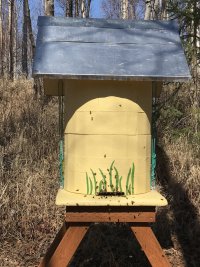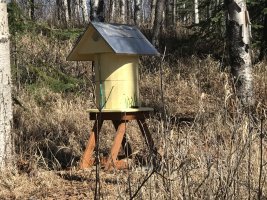Alasgun
Loving the herd life
The tree hive wintered fine and they are quite active right now. This is my first experience with the Carnolians, as i’ve always used Italian‘s or Buckfast in the past.
A lot of study went into my hive body which emulates a large hollow tree section and is designed to be Bee friendly, not beekeeper friendly. I’d mentioned previously, i don’t intend to take any honey from them.
they started as a 4 lb package last spring and built enough comb on starter strips (no foundation) AND loaded it with sufficient stores to make it thru the Alaskan winter!
With this kind of activity, i’ll have to make another hive section before the middle of July!
the hive is 20 inch diameter and 24 inches tall.
A lot of study went into my hive body which emulates a large hollow tree section and is designed to be Bee friendly, not beekeeper friendly. I’d mentioned previously, i don’t intend to take any honey from them.
they started as a 4 lb package last spring and built enough comb on starter strips (no foundation) AND loaded it with sufficient stores to make it thru the Alaskan winter!
With this kind of activity, i’ll have to make another hive section before the middle of July!
the hive is 20 inch diameter and 24 inches tall.


